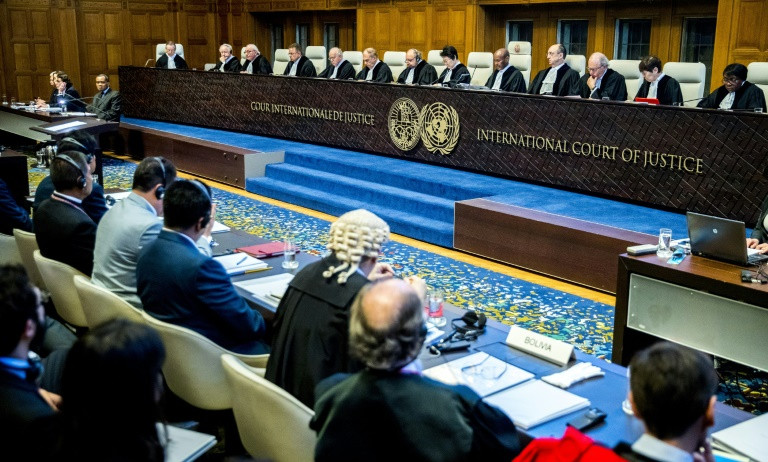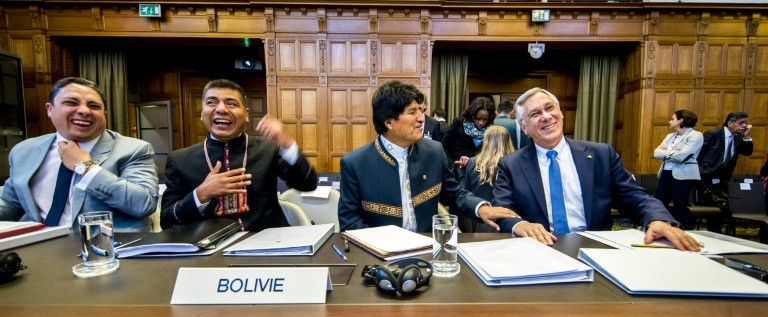
Following some 130 years of fruitless negotiations with Santiago, La Paz lodged a complaint with the ICJ in April 2013. (Photo: AFP)
Bolivian President Evo Morales on Monday appealed to UN judges to help end over a century of isolation from the seas and stimulate economic growth in his landlocked and impoverished country.
Heading up the Bolivian delegation at a long-awaited case at the UN's top court, Morales insisted his South American country had "a just cause" against neighbouring Chile.
"We have come here after 139 years of maritime confinement to demonstrate to the world that Chile has failed to comply with its commitments," he told reporters.
The century-old dispute revolves around moves by Bolivia to restore badly-needed access to the Pacific Ocean, which it lost at the end of a four-year war in 1883 when it forfeited certain rights and territory.
La Paz is urging Santiago to reopen talks, contending Chile has "an obligation to negotiate with Bolivia" to reach an agreement.
Following some 130 years of fruitless negotiations with Santiago, La Paz lodged a complaint with the International Court of Justice (ICJ) based in The Hague in April 2013.
"Bolivia was born with the sea and both are inseparable. Since its forced closure, our country has suffered limitations in its growth and development," Morales said, at the end of the first day of hearings.
Nor could Bolivia "take advantage of the riches and opportunities offered by the oceans," he said.
Bolivia is asking the court to rule that Chile is obliged under international law to negotiate a successful resolution to the dispute.

Bolivian President Evo Morales is heading up the Bolivian delegation to the hearings. (Photo: AFP)
Chile had made "a repeated and consistent commitment to Bolivia to end its landlocked situation," former Bolivian president Eduardo Rodriguez Veltze told the court.
"By fulfilling this promise to its neighbour, two countries united by culture, geography, history and fraternal spirit can heal all wounds and move forward," Veltze added.
But Chile has argued the issue was resolved under a 1904 treaty between the two nations.
"The 1904 treaty was validly concluded and is fully in force. And that treaty clearly and precisely established the boundaries between Chile and Bolivia," said Chilean President Sebastian Pinera in Santiago.
"Thus Chile has no pending border issues with Bolivia and therefore has no obligation to negotiate border issues with Bolivia."
- 'Painful loss' -
The ICJ judges were told that Bolivia used to have 400 kilometres (248 miles) of Pacific coastline which it accessed via the Atacama desert.
"Today it has none," said Veltze, who stressed the importance of the court action saying the "entire Bolivian nation" was tuning into the proceedings in The Hague via giant screens erected in their cities.
According to estimates, Bolivia's "annual GDP growth would be at least 20 percent higher" if it had not been stripped of a sea access, he argued.
Its transport costs are estimated to be 31 percent higher than the continental average, Veltze said.
"More than a century has passed since the Chilean invasion of Bolivia's coast... an act of aggression that resulted in territorial dismemberment and the painful loss of sovereign access to the sea."
Allowing access "would make a small difference to Chile, but it would transform the destiny of Bolivia," Veltze said.
After the opening days on Monday and Tuesday, Chile will get to make its counter-argument at the court on Thursday and Friday. Three more days of talks are planned next week.
The two countries have not had formal diplomatic relations since 1978. Santiago has meanwhile opened its own case against Bolivia over the Silala waterway, which flows into the parched Atacama and which La Paz has threatened to divert.
Bolivian activists say the loss of the Chuquicamata mine, the world's largest open-pit copper mine which is situated in the disputed area, has also badly hit the country's indigenous peoples.


